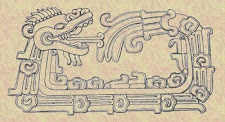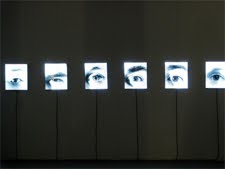Book Excerpt: Jorge Luis Borges, The Secret Miracle (from Labyrinths)
Does time really speed up as we get older or do we just perceive it to? If it's a matter of perception then it should also be possible to slow time down. Maybe even way down like the main character in Jorge Luis Borges' short story The Secret Miracle...
"From behind the door, Hladik had visualized a labyrinth of passageways, stairs, and connecting blocks. Reality was less rewarding: the party descended to an inner courtyard by a single iron stairway. Some soldiers - uniforms unbuttoned - were testing a motorcycle and disputing their conclusions. The sergeant looked at his watch: it was 8:44 am. They must wait until nine. Hladik, more insignificant than pitiful, sat down on a pile of firewood. He noticed that the soldiers' eyes avoided his. To make his wait easier, the sergeant offered him a cigarette. Hladik did not smoke. He accepted the cigarette out of politeness or humility. As he lit it, he saw that his hands shook. The day was clouding over. The soldiers spoke in low tones, as though he were already dead. Vainly, he strove to recall the woman of whom Julia de Weidenau was the symbol…
The firing squad fell in and was brought to attention. Hladik, standing against the barracks wall, waited for the volley. Someone expressed fear the wall would be splashed with blood. The condemned man was ordered to step forward a few paces. Hladik recalled, absurdly, the preliminary maneuvers of a photographer. A heavy drop of rain grazed one of Hladik's temples and slowly rolled down his cheek. The sergeant barked the final command.
The physical universe stood still.
The rifles converged upon Hladik, but the men assigned to pull the triggers were immobile. The sergeant's arm eternalized an inconclusive gesture. Upon a courtyard flagstone a bee cast a stationary shadow. The wind had halted, as in a painted picture. Hladik began a shriek, a syllable, a twist of the hand. He realized he was paralyzed. Not a sound reached him from the stricken world.
He thought: I'm in hell, I'm dead.
He thought: I've gone mad.
Then he reflected that in that case, his thought, too, would have come to a halt. He was anxious to test this possibility: he repeated (without moving his lips) the mysterious Fourth Eclogue of Virgil. He imagined that the already remote soldiers shared his anxiety; he longed to communicate with them. He was astonished that he felt no fatigue, no vertigo from his protracted immobility. After an indeterminate length of time he fell asleep. On awakening he found the world still motionless and numb. The drop of water still clung to his cheek; the shadow of the bee still did not shift in the courtyard; the smoke from the cigarette he had thrown down did not blow away. Another "day" passed before Hladik understood.
He had asked God for an entire year in which to finish his work: His omnipotence had granted him the time. For his sake, God projected a secret miracle: German lead would kill him, at the determined hour, but in his mind a year would elapse between the command to fire and its execution. From perplexity he passed to stupor, from stupor to resignation, from resignation to sudden gratitude.
He disposed of no document but his own memory; the mastering of each hexameter as he added it, had imposed upon him a kind of fortunate discipline not imagined by those amateurs who forget their vague, ephemeral paragraphs. He did not work for posterity, nor even for God, of whose literary preferences he possessed scant knowledge. Meticulous, unmoving, secretive, he wove his lofty invisible labyrinth in time. He worked the third act over twice. He eliminated some rather too-obvious symbols: the repeated striking of the hour, the music. There were no circumstances to constrain him. He omitted, condensed, amplified; occasionally, he chose the primitive version. He grew to love the courtyard, the barracks; one of the faces endlessly confronting him made him modify his conception of Roemerstadt's character. He discovered that the hard cacophonies which so distressed Flaubert are mere visual superstitions: debilities and annoyances of the written word, not of the sonorous, the sounding one… He brought his drama to a conclusion: he lacked only a single epithet. He found it: the drop of water slid down his cheek. He began a wild cry, moved his face aside. A quadruple blast brought him down.
Jaromir Hladik died on March 29, at 9:02 in the morning."
I find this story fascinating not only for exploring the subjective nature of time, but also the intangible value of human endeavor and experience. Why was it satisfying or worthwhile for the playwright to finish a play that no one would ever read? When he prayed for the opportunity to finish his play surely he meant the opportunity to write it down and leave it for posterity. But, in his reprieve from death he grew to love the act of creativity in and of itself and to appreciate the beauty of all the details around him that he wouldn't even have noticed in the normal flow of time.
This story takes the idea that life's challenges offer its greatest rewards and turns the screw one rotation further - giving actual shape to a man's answered prayers. We throw around many vague notions of fulfillment and the steps we think we must take to get there, but if each of us were granted our own secret miracle, what form would it take and would we immediately recognize it?
This reminds me of the many times I didn't have a camera handy to capture a vista or sunset or a tape recorder or pen to record an inspirational song or story idea that later slipped away - even worse - when my camera was stolen in Baja with a full roll of undeveloped film in it and when a bad memory card obliterated a journey up the California Coast. I was obviously very disappointed, but faced with no other remedy, I decided to try to make the best of what appeared to be a bad situation by paying extra attention to every detail - taking vivid mental pictures that only I would ever see.
This acceptance of my predicament, this letting go, was such a gratifying experience that it made me wonder how many times in my excitement to capture or share the perfect moment I'd diminished it by rushing to grab the camera or to tell a friend, "Look, look at how beautiful it is!" Perhaps, the playwright in Borge's story enjoyed the creation of that final play more than any of his previous plays precisely because he knew it was his alone.
Is this the secret to slowing time down? Was it truly a God given miracle or did the playwright freeze time of his own will? I've heard of stranger things. Like black holes smaller than the head of a pin and invisible fourth and fifth dimensions curled up all around us. Maybe the fountain of youth is not a drink at all, but a state of mind and some monk in the Himalayas has lived a millennium in the last fifty years.
We all have our own bullets. They were locked and loaded the day we were born. When they will be fired is impossible to know, but regardless of how much time we have remaining, it is ours to use as we choose and it may even be ours to bend.
travel, philosophy, art, culture
Blog Archive
Music
Video: Derek Paravicini - Musical Genius
Video: M Ward - Chinese TranslationMusic
Video: Jennifer Grout - sings Umm Kulthum on "Arabs Got Talent"
Photos
Baja Surf Trip
Topanga Canyon, Fall 2010
Devils Tower Sequence
Spring/Summer 2010 Travel Pics
More Travel Pics
My Summer Home in Oregon
Clark Little Surf Photography
Videos
Music: M Ward - Chinese Translation
Interview: linguist David Harrison
Music: Derek Paravicini - Musical Genius
Video: Derek Paravicini - Musical Genius
Video: M Ward - Chinese TranslationMusic
Video: Jennifer Grout - sings Umm Kulthum on "Arabs Got Talent"
Photos
Baja Surf Trip
Topanga Canyon, Fall 2010
Devils Tower Sequence
Spring/Summer 2010 Travel Pics
More Travel Pics
My Summer Home in Oregon
Clark Little Surf Photography
Videos
Music: M Ward - Chinese Translation
Interview: linguist David Harrison
Music: Derek Paravicini - Musical Genius
Video: One in 8 Million: photo essays of individual New Yorker's lives (from The New York Times)
Music: Jennifer Grout - Sings Umm Kulthum on "Arabs Got Talent"
Poetry
Music: Jennifer Grout - Sings Umm Kulthum on "Arabs Got Talent"
Poetry
Denice Cacace - Haiku
John Keats - Bright Star
John Updike - A Rescue
Billy Collins - Thesaurus
John Dunn - Handwritten Letter
John Dunn - Gettin' All Poetiky
Johann Wolfgang Von Goethe - The Erl-King
Books
Edward Abbey - Manhattan Twilight, Hoboken Night (from The Journey Home)
Don Delillo - Underworld
Jorge Luis Borges - The Secret Miracle (From Labyrinths)
Robert Penn Warren - All The King's Men
John Keats - Bright Star
John Updike - A Rescue
Billy Collins - Thesaurus
John Dunn - Handwritten Letter
John Dunn - Gettin' All Poetiky
Johann Wolfgang Von Goethe - The Erl-King
Books
Edward Abbey - Manhattan Twilight, Hoboken Night (from The Journey Home)
Don Delillo - Underworld
Jorge Luis Borges - The Secret Miracle (From Labyrinths)
Robert Penn Warren - All The King's Men
Essays
Multiple authors: Fifteen Unforgettable Movie Moments (from Salon)
John Dunn: LA Love Letter
John Dunn: Impressions of the Badlands, Black Hills and Little Bighorn
Matt Power: Mississippi Drift - River Vagrants in the Age of Wal-Mart (from Harper's)
Kevin Fedarko: High in Hell - An Epic Drug Fueled Travel Story (from Esquire)
John Dunn: Getting Myspaced - Self Discovery Through Social Networking
John Bradley: Golf Bro Will Mackenzie - Making it Cool to Watch Golf Again (from Outside)
John Dunn: Golf Course Review: Old Macdonald - Doak's Encore at Bandon
John Dunn: LA Love Letter
John Dunn: Impressions of the Badlands, Black Hills and Little Bighorn
Matt Power: Mississippi Drift - River Vagrants in the Age of Wal-Mart (from Harper's)
Kevin Fedarko: High in Hell - An Epic Drug Fueled Travel Story (from Esquire)
John Dunn: Getting Myspaced - Self Discovery Through Social Networking
John Bradley: Golf Bro Will Mackenzie - Making it Cool to Watch Golf Again (from Outside)
John Dunn: Golf Course Review: Old Macdonald - Doak's Encore at Bandon

"A weird, lovely, fantastic object out of nature like Delicate Arch has the curious ability to remind us - like rock and sunlight and wind and wildflowers - that out there is a different world, older and greater and deeper by far than ours, a world which sustains the little world of man as sea and sky surround and sustain a ship. For a little while we are again able to see, as the child sees, a world of marvels. For a few moments we discover that nothing can be taken for granted, for if this ring of stone is marvelous, then all which shaped it is marvelous, and our journey here on Earth, able to see and touch and hear in the midst of tangible and mysterious things-in-themselves, is the most strange and daring of all adventures." - Edward Abbey, Desert Solitaire

"It is impossible to convey the life-sensation of any given epoch of one's existence - that which makes its truth, its meaning, its subtle penetrating essence. It is impossible. We live, as we dream, alone." - Joseph Conrad, Heart of Darkness

"Full circle from the tomb of the womb to the womb of the tomb we come, an ambiguous, enigmatical incursion into a world of solid matter that is soon to melt from us like the substance of a dream." - Joseph Campbell, Hero with a 1000 Faces

"The cactus of the high desert is a small grubby, obscure and humble vegetable associated with cattle dung and overgrazing, interesting only when you tangle with it the wrong way. Yet from this nest of thorns, this snare of hooks and fiery spines, is born once each year a splendid flower. It is unpluckable and except to an insect almost unapproachable, yet soft, lovely, sweet, desirable, exemplifying better than the rose among thorns the unity of opposites" - Edward Abbey, Desert Solitaire

"He knew that the very memory of the piano falsified still further the perspective in which he saw the elements of music, that the field open to the musician is not a miserable stave of seven notes, but an immeasurable keyboard on which, here and there only, separated by the thick darkness of its unexplored tracts, some few of the millions of keys of tenderness, of passion, of courage, of serenity, which compose it, each one differing from all the rest as one universe differs from another, have been discovered by a few great artists who do us all a service, when they awaken in us the emotion corresponding to the theme they have discovered, of showing us what richness, what variety lies hidden, unknown to us, in that vast, unfathomed and forbidden night of our soul." - Marcel Proust, Swann's Way

"Perhaps it is not-being that is the true state, and all our dreams of life are inexistent. We shall perish, but we have as hostages these phrases of music, these divine captives who will follow and share our fate. And death in their company is somehow less bitter, less inglorious, perhaps even less probable." - Marcel Proust, Swann's Way

"The creature was very young. He was alone in a dread universe. I crept on my knees and crouched beside him. It was a small fox pup from a den under the timbers who looked up at me. God knows what had become of his brothers and sisters. His parents must not have been home from hunting. He innocently selected what I think was a chicken bone from an untidy pile of splintered rubbish and shook it at me invitingly... the universe was swinging in some fantastic fashion around to present its face and the face was so small that the universe itself was laughing.
It was not a time for human dignity. It was a time only for the careful observance of amenities written behind the stars. Gravely I arranged my forepaws while the puppy whimpered with ill-concealed excitement. I drew the breath of a fox's den into my nostrils. On impulse, I picked up clumsily a whiter bone and shook it in teeth that had not entirely forgotten their original purpose. Round and round we tumbled and for just one ecstatic moment I held the universe at bay by the simple expedient of sitting on my haunches before a fox den and tumbling about with a chicken bone. It is the gravest, most meaningful act I shall ever accomplish, but, as Thoreau once remarked of some peculiar errand of his own, there is no use reporting it to the Royal Society." - Loren Eiseley, The Star Thrower
It was not a time for human dignity. It was a time only for the careful observance of amenities written behind the stars. Gravely I arranged my forepaws while the puppy whimpered with ill-concealed excitement. I drew the breath of a fox's den into my nostrils. On impulse, I picked up clumsily a whiter bone and shook it in teeth that had not entirely forgotten their original purpose. Round and round we tumbled and for just one ecstatic moment I held the universe at bay by the simple expedient of sitting on my haunches before a fox den and tumbling about with a chicken bone. It is the gravest, most meaningful act I shall ever accomplish, but, as Thoreau once remarked of some peculiar errand of his own, there is no use reporting it to the Royal Society." - Loren Eiseley, The Star Thrower

The moment I stepped out the front door I was faced again with Manhattan. There it was, oh splendid ship of concrete and steel, aluminum, glass and electricity, forging forever up the dark river. (The hudson - like a river of oil, filthy and rich, gleaming with silver lights.) Manhattan at twilight: floating gardens of tender neon, the lavender towers where each window glittered at sundown with reflected incandescence, where each crosstown street became at evening a gash of golden fire, and the endless flow of the endless traffic on the West Side Highway resembled a luminous necklace strung round the island's shoulders. - Edward Abbey, Manhattan Twilight, Hoboken Night

Sometimes I see something so moving I know I'm not supposed to linger. See it and leave. If you stay too long, you wear out the wordless shock. Love it and trust it and leave. - Don Delillo, Underworld

Yes. Because they were human men. They were trying to write down the heart's truth out of the heart's driving complexity, for all the complex and troubled hearts which would beat after them. - William Faulkner, The Bear

He picks up speed and seems to lose his gangliness, the slouchy funk of hormones and unbelonging and all the stammering things that seal his adolescence. He is just a running boy, a half-seen figure from the streets, but the way running reveals some clue to being, the way a runner bares himself to consciousness, this is how the dark-skinned kid seems to open to the world, how the bloodrush of a dozen strides bring him into eloquence. - Don Delillo, Underworld

If somewhere beneath the blood, the past must beat in me to make a rhythm of survival for itself - to go on as this half-life which echoes as a second pulse inside the ticking moments of my existence - if this is what must be, why is the pattern of remembered instants so uneven, so gapped and rutted and plunging and soaring? I can only believe it is because memory takes its pattern from the earliest moments of the mind, from childhood. And childhood is a most queer flame-lit and shadow-chilled time. - Ivan Doig, This House of Sky

The storm front towered above them and the wind was cool on their sweating faces. They slumped bleary-eyed in their saddles and looked at one another. Shrouded in the black thunderheads the distant lightning glowed mutely like welding seen through foundry smoke. As if repairs were under way at some flawed place in the iron dark of the world. - Cormac McCarthy, All the Pretty Horses
.jpg)
Men believe the cure for war is war as the curandero prescribes the serpent's flesh for its bite. - Cormac McCarthy, All the Pretty Horses

Big production, no story, as they say around the movie lots. I guess Sylvia is happy enough, though not necessarily with me. In our circle that's not too important. There's always something to do if you don't have to work or consider the cost. It's no real fun, but the rich don't know that. They never had any. They never want anything very hard except maybe somebody else's wife and that's a pretty pale desire compared to the way a plumber's wife wants new curtains for the living room. - Raymond Chandler, The Long Goodbye
The charged atmosphere made every little thing stand out as a performance, a movement distinct and vastly important. It was one of those hypersensitive moments when all your automatic movements, however long established, however habitual, become separate acts of will. You are like a man learning to walk after polio. You take nothing for granted, absolutely nothing at all. - Raymond Chandler, The Long Goodbye
We live entirely, especially if we are writers, by the imposition of a narrative line upon disparate images, by the "ideas" with which we have learned to freeze the shifting phantasmagoria which is our actual experience. - Joan Didion, The White Album

Seattle rain smells different from New Orleans rain... New Orleans rain smells of sulfur and hibiscus, trumpet metal, thunder and sweat. Seattle rain, the widespread rain of the Great Northwest, smells of green ice and sumi ink, of geology and silence and minnow breath. - Tom Robbins, Jitterbug Perfume

"There was a special pallor in the face of the New York emigres. Lasher and Grappa in particular. They had the wanness of obsession, of powerful appetites confined to small spaces. Murray said that Eliot Nasher had film noir face. His features were sharply defined, his hair perfumed with some oily extract. I had the curious thought that these men were nostalgic for black-and-white, their longings dominated by achromatic values, personal extremes of postwar urban gray." - Don Delillo, White Noise








No comments:
Post a Comment